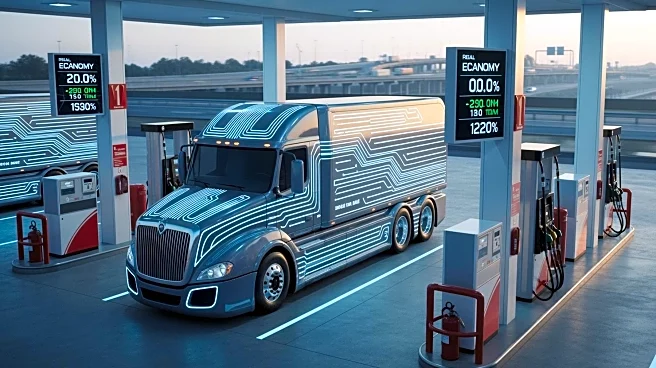What's Happening?
Fleet drivers are adopting various strategies to improve fuel efficiency in diesel trucks, as highlighted in a recent study by the North American Council for Freight Efficiency (NACFE). The study, titled 'Run on Less – Messy Middle,' showcased drivers achieving
higher miles per gallon than the national average of 6.91 mpg. Some drivers reported averages as high as 11.6 mpg over 22,550 miles. Key strategies include reducing speed, optimizing routing to avoid congestion, and maintaining proper following distances to minimize braking. These practices can lead to a 3% to 5% improvement in fuel economy, translating into significant cost savings.
Why It's Important?
Improving fuel efficiency in diesel trucks is crucial for both economic and environmental reasons. Fuel costs are a major expense for fleet operators, and even small improvements in miles per gallon can result in substantial savings. Additionally, better fuel efficiency reduces carbon emissions, contributing to environmental sustainability. Fleet operators and drivers who adopt these strategies not only benefit financially but also support broader efforts to reduce the transportation sector's environmental impact. This aligns with industry trends towards greener practices and can enhance the reputation of companies committed to sustainability.
What's Next?
Fleet operators are likely to continue exploring and implementing fuel efficiency strategies as part of their operational practices. This may include investing in driver training programs focused on fuel-efficient driving techniques and adopting technologies that support better fuel management. As awareness of the benefits grows, more companies may participate in studies like NACFE's to benchmark their performance and share best practices. Additionally, regulatory pressures and consumer demand for sustainable practices may drive further innovation in fuel efficiency technologies and strategies.
Beyond the Headlines
The push for improved fuel efficiency in the trucking industry may lead to broader changes in logistics and transportation practices. As companies prioritize sustainability, there could be increased investment in alternative fuels and hybrid technologies. This shift may also influence policy discussions around transportation infrastructure and emissions standards, potentially leading to new regulations that support greener practices. The cultural shift towards environmental responsibility in the industry could foster collaboration between companies, regulators, and environmental groups to achieve common goals.














